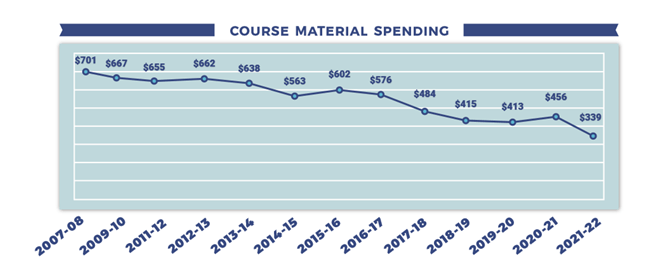College Stores Deliver a Double-Digit Lesson on Savings
Innovations Lower Student Spending on Course Materials by 26% in 2022
Contact: publicrelations@nacs.org
FOR IMMEDIATE RELEASE
OBERLIN, OH (August 31, 2022)–As college students return to campus for the new semester, savvy shoppers will head to their campus stores in person and online to take advantage of superior customer service and money-saving options and discounts offered on course materials such as electronic textbooks, rentals, used books, and more.
According to a recent study by Inside Higher Education and College Pulse, students ranked campus stores third best of 18 nonacademic departments identified for having good service (replying quickly, resolving the issue, being kind, etc.)
Also, 72% of students that purchased one or more course materials during the 2021-2022 academic year did so at the campus bookstore, according to Student Watch™: Attitudes and Behaviors Toward Course Materials. Student Watch™ is developed by OnCampus Research, the research arm of the National Association of College Stores (NACS).
Since 2008 student spending on required college course materials has declined by nearly 52%. In the 2021-2022 academic year alone spending fell by 26% from the previous year.
These declines are due to a variety of innovations developed by college stores and their parent institutions. Stores now offer specially discounted digital and print course content, rental and used textbooks, as well as a growing collection of free digital materials. These options are often a fraction of the price of buying a new textbook.
College stores were the first in higher education to embrace and innovate price comparison shopping and marketplaces allowing students to easily compare prices and purchase from a variety of sources. Also, many campus stores offer price matching, price guarantees, ensure sales tax exemptions are applied at checkout, discounts for early reservations, free in-store or curbside pickup for online orders, and access now, pay-later options.
NACS offers the following tips to students on ways to save:
- Inquire whether your college or university offers a discounted course material program, sometimes referred to as inclusive access or first-day access program. Some institutions have established programs to further reduce the cost of required course materials and give students trial access until the add-drop deadline.
- Shop early. It doesn’t pay to procrastinate. The sooner students shop, the more likely they are to find a good selection of used books and rentals.
- Make sure to ask the store staff about the various savings programs offered. Staff are eager to help.
- Check the campus store’s website for a price-comparison marketplace tool.
- Rent course materials. Renting materials from the campus store helps avoid the shipping hassles and returns students may experience with online companies and surprise charges.
- Buy used or electronic textbooks and course materials. These options are often one-third to half the price of buying a new print textbook.
- Know the refund policy. If a student drops a class or the professor decides not to use the textbook, the student will need to return it before the deadline to get a full refund.
- Students should not write in or unwrap books or course materials until they are certain they will keep them. Most sellers won’t give full credit for course materials that have been marked up or opened.
- When purchasing digital materials with shorter-term licenses, do not activate the license until close to the start of classes.
- Keep receipts in a safe place. Most retailers require them for returns. Receipts can also be turned into cash through the American Opportunity Tax Credit. See www.textbookaid.org
- Be careful when shopping online. Is the seller a credible business? Be cautious of too-good-to-be-true-priced fake or expired access codes. Ensure you’re not overcharged for sales taxes if you qualify for an exemption. Don’t forget about shipping costs. Know the full price of buying online. If students need to return a book, they need to know the costs involved.
- Use a credit card when buying from online retailers in case a charge needs to be disputed.
About The National Association of College Stores: The National Association of College Stores (NACS) is the professional trade association representing the collegiate retailing industry. NACS represents campus retailers and industry-related companies that supply course materials and other merchandise and services to campus stores. NACS provides education and other resources that help its member stores support student success, the campus experience, and the missions of higher education institutions.





